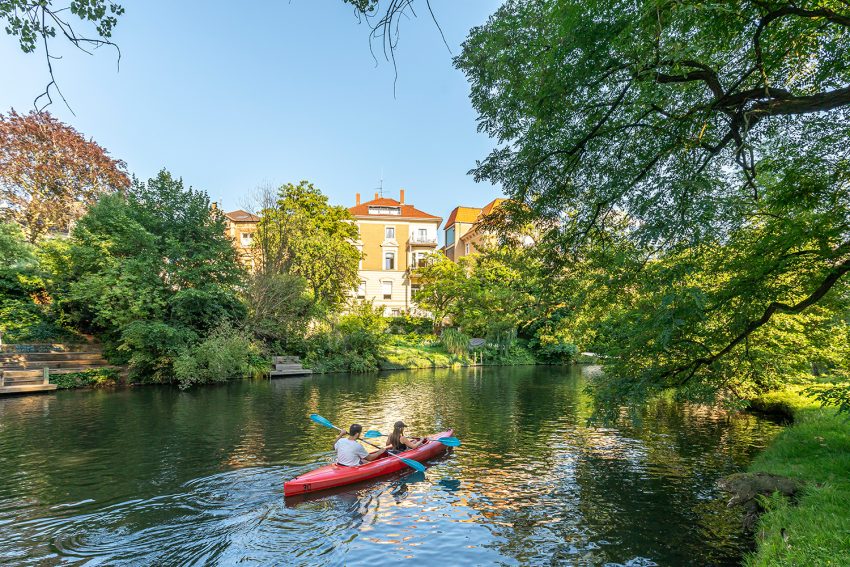Braunschweig sets course for climate adaptation Closing event for the ‘Co-Adapted Braunschweig’ project
Joint press release from the City of Braunschweig and TU Braunschweig
How can Braunschweig better adapt to the consequences of climate change, such as heat, drought and heavy rainfall? The joint project ‘Co-Adapted Braunschweig’ (COABS) has developed answers to these questions. The project partners are the City of Braunschweig, Department of Environment, the ISU – Institute for Sustainable Urbanism and the Institute for Geoecology at Technische Universität Braunschweig. Interested citizens are invited to the project’s closing event on Wednesday, 10 September, from 5 to 8 p.m. in the conference rooms of the BraWoPark Business Centre III, Willy-Brandt-Platz 13.

How can Braunschweig better adapt to the consequences of climate change? Photo credits: Braunschweig Stadtmarketing GmbH/Christian Bierwagen
Key components for an urban climate adaptation strategy will be presented, supplemented by practical examples of neighbourhood initiatives within urban society. The COABS team welcomes guest speakers Dr. Enke Frank from the Lower Saxony Competence Centre for Climate Change, Prof. Dr. Angela Ittel, President of TU Braunschweig, and Anna Katharina Hanusch, Head of the Department of Environment, Urban Greenery and Building Construction of the City of Braunschweig. Those interested can register for the event at www.braunschweig.de/anmeldung-coabs.
The closing event on 10 September will provide a comprehensive insight into the key findings of the project, focusing on the climate risk analysis for Braunschweig, a co-creatively developed portfolio of measures for adapting to climate change, and pilot projects in various urban districts. A special focus of the event will be on the interactive presentation of results, projects and initiatives from administration, research and urban society that showcase exemplary and leading examples of climate adaptation in Braunschweig. In line with the co-creative project approach, the event will provide space for personal exchange and active networking.
It also looks to the future: how can the city of Braunschweig master the challenges of climate change adaptation beyond the end of the project in close cooperation with politics, administration, research, business and urban society? Current projects that bring together research and practice will be presented, such as the Klima.Zukunftslabore Urban Climate Future Lab (spokesperson Professor Vanessa Miriam Carlow, ISU) and UMEX Hope (participation Professor Stephan Weber, Institute for Geoecology), both funded by zukunft.niedersachsen.
Further information on the Co-Adapted Braunschweig project is available at www.braunschweig.de/coabs
Registration for the closing event at www.braunschweig.de/anmeldung-coabs
The Co-Adapted Braunschweig project
The Co-Adapted Braunschweig (COABS) project, funded by the Federal Environment Ministry, is an important milestone in the development of a municipal climate adaptation strategy and the establishment of a committed network of actors for climate adaptation in Braunschweig. In a broad, interdisciplinary and transdisciplinary dialogue, the project participants have been working since 2022 to develop projects that advance the climate adaptation process in the city of Braunschweig. A wide variety of stakeholders from research, city administration and urban society have contributed their expertise, implementation experience and a great deal of commitment.
In a first step, the consequences of climate change for the city of Braunschweig and its citizens, as well as locally relevant impacts and climate risks, were identified, evaluated and summarised in three central fields of action. This strategic approach to climate adaptation – from climate risk analysis and the development of models and principles to the recommendation of a tailor-made portfolio of measures – was finally put into practice through pilot projects and thus successfully transferred into implementation. This also provided an opportunity to test interdisciplinary cooperation and the early consideration of climate impact adaptation aspects in planning processes.
Under the motto ‘Small spaces – big impact’, the Co-Adapted team called for the submission of co-creative ideas for adapting to the consequences of climate change at the beginning of the year. The selected pilot projects exemplify how climate adaptation can be successfully implemented in Braunschweig, promote cooperation between urban society, administration and experts, and strengthen neighbourhood networks for climate-resilient public and private spaces. For an urban climate pilot project, the COABS project sought cooperation with the Social City – Donauviertel development area. The aim of the pilot project was to translate the principles developed for climate adaptation into effective and feasible adaptation strategies and to make them visible in the design of a specific urban space. Using the example of the Möhlkamp residential street, the ISU – Institute for Sustainable Urbanism at TU Braunschweig impressively demonstrates the diverse potential that arises when the necessary transformation of street spaces is combined with climate adaptation measures. In this way, urban spaces and adjacent neighbourhoods and districts can be developed sustainably and with a high quality of life.
